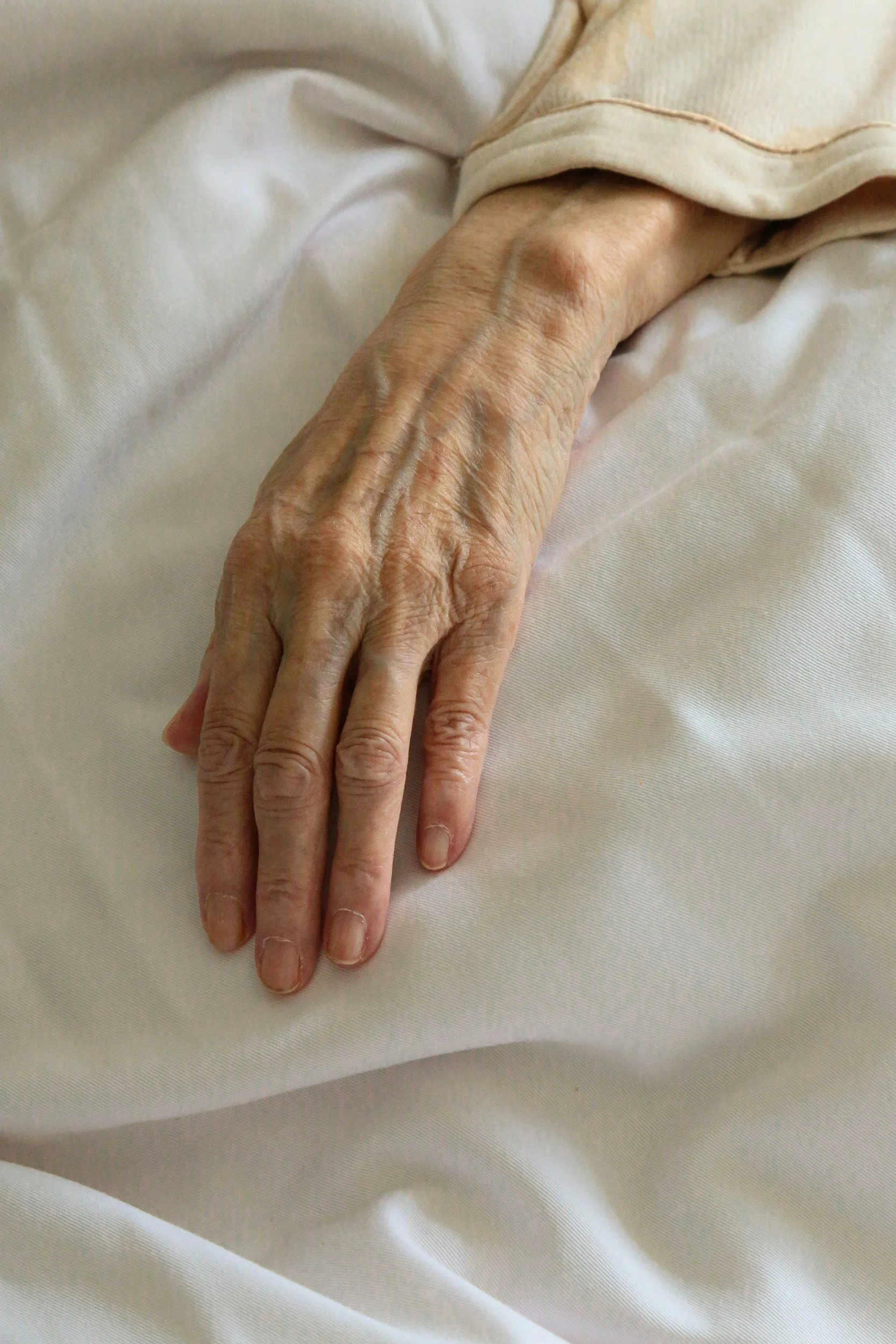Lazarus
Uncle George lay on his back on the hospice bed looking his ninety-four years for the first time. His usual ruddy face was as pale as the bleached sheets nearly shrouding him.
My cousin had warned me, "Dad's unconscious. He won't recognize you."
I thought I was prepared.
I expected to find Uncle George lying still, serene even, as if settling into a long overdue nap. But, Uncle George was far from calm. He was “actively dying”— a phrase I learned later and an apt description. His legs shifted sporadically under the sheets. He flexed his hands to his own rhythm. White knuckled, he’d jerk one towards his chest, his face, or across his midriff to scratch his forearm with curled fingers. His eyes were half open, unseeing, glassy, the lids twitching. Slight exhalations passed through his half-open mouth interrupted by gasps or gurgles. I reached for his hand. It was cold. He yanked it away. Dejected, I dragged a heavy upholstered chair up to his bed and sat down to keep watch.
It was quiet in the Hospice Center, the lights dimmed. The walls, drapes, furniture, and carpet were all complementary gradations of beige, akin to a bland cocoon keeping the din of the messy world at bay. A painting of a small house nestled in a fuzzy, pastel flurry of flowers and abundant greenery hung on the wall above the bed. It was a Robert Kinkaid print from his “glowing” cottage series — calming kitsch. Debussy’s Reverie lilted up and down a piano keyboard in the background. Yet all this staged tranquility clashed with reality for Uncle George was not having a peaceful death. His veered towards the surreal, the atonal, a dissonance more reminiscent of the bleak landscape of a Salvatore Dali portrait or the sharp turns and minor twists of an Igor Stravinsky composition.
Uncle George and I met for lunch once a month at Panera. We talked on the phone every week. At times, I would stop by his house with a pizza to eat in front of the television, binge-watching Golden Girls or CSI. We had an easy relationship. Comfortable in a kind of intimacy that didn’t require much beyond showing up.
His wife had died thirteen years previously. After she passed, he arranged pillows under the bedspread on her side of the bed. A private act I wasn’t supposed to see. He probably forgot about it when he asked me to retrieve his cane from his bedroom during one of my visits. It struck me as such a poignant expression of grief, one that found comfort from a pile of pillows situated strategically where his wife’s body used to be—soft, huggable, and within reach.
The nurse walked in with Uncle George's morphine shot.
“Does he know I’m here,” I said.
“You should talk to him. It may comfort him.” She smiled and left the room.
I was doubtful he could hear me, but guilt overrode my skepticism.
“You’re a good man, Uncle George," I started. "I admire you. I love you. I’ll miss you. Who am I going to watch Golden Girls with?”
I spoke loudly, enunciating my words, the way I usually talked to him as he refused to wear his hearing aids.
“Soon you will be with Joey. She’s waiting in heaven.”
I spoke in the same spirit I’d use to tell a person what they wanted to hear, whether I believed it or not—and I didn’t. My Aunt Joey had “found” God,” as she described it, decades before she died. Uncle George never did. Like me, he probably didn’t believe she’d be waiting in a place called heaven either.
My ninety-year-old mother confided in me once that she speaks to her long-dead mother and sister, “All the time,” she said.
For her, there is no question they are in heaven listening. I wish I had that kind of faith. The kind that endures despite the facts stating otherwise. How reassuring it must be to have something to hold onto, to rely on. What I do believe is that loved ones who die never really leave. Our memories won’t let them. Love doesn’t have a cut-off point. Maybe that’s a kind of faith too?
I told Uncle George he was a good husband, father, brother, son. I repeated, “I’ll miss you,” and then I stopped. I felt like a phony and couldn’t think of anything more to say. His body was like a solid thing, blocking my way to him and muffling the sound. It was a lost connection. I rationalized that, if Uncle George could hear me, all he’d want to say is goodbye.
He was ready to go.
“Driving to the office every day is what keeps me going,” Uncle George used to say. “Once that stops, that’ll be it.”
His exact words, “That’ll be it.”
The “office” was Weichert Realtors in Short Hills, New Jersey. He had been an agent there since 1995 after closing the real estate business he had owned for forty years in nearby Millburn. He hadn't sold a property in seventeen years. Yet, he continued carrying business cards, visiting open houses if there weren't too many stairs, and attending weekly office meetings.
I went along with the delusion. When we made lunch plans he always had to check his schedule.
“No good. I have a staff meeting Wednesday at one o’clock.”
I didn’t question it. Going to the “office” was a lifeline to who he had once been. Letting go of that would mean he was nothing.
So, every weekday he would drive to the “office,” scroll through listings on the computer in the break room and jot down prodigious notes in blue ink on a yellow legal pad. Nobody minded his coming in. The staff liked him. They remembered when he was a vibrant, valued agent and, before that, a successful business owner. But as the years passed, those who knew him moved on, and many from his generation died. Eventually, the new hires began to wonder who the old man hobbling in on a cane day was.
Two days after his ninety-fourth birthday Uncle George rear-ended a car at a stop sign. His license was revoked, but he continued driving to the office. It didn’t last long. Within a month, the thirty-something-new manager at Weichert’s banned him from the building. Called him a liability risk. Two weeks later he fell at home and was rushed to the hospital where he stayed for a month before being transferred to the hospice facility.
Uncle George was right. Once he couldn't drive to the office, that was it.
Uncle George’s right arm shot up suddenly, startling me. He held it there for seconds before lowering it to the bed. It would have been comforting to believe it was a sign, a message from the “other side” perhaps, or a last goodbye meant only for me. Like Lazarus rising from the dead. But, the nurse told me it was a reflex movement in brain-dead patients.
“Nothing to worry about,” she said.
I placed my hand on the bedspread near Uncle George’s arm and attempted to conjure emotion. I couldn’t see the man beyond the body that betrayed him by sticking around longer than he did. Perhaps, that's why I felt nothing. He was no longer there to love.
I checked the time often. After three hours passed I kissed him on the forehead, whispered I love you and rushed outside and into my car. It was dark by then. I leaned my head on the steering wheel and sobbed out the grief that eluded me at his bedside.
I was the only car on the Pulaski Highway. It was March 2020, the beginning of the coronavirus pandemic. In the distance, the New York City skyline shimmered. The Empire State Building was lit red and pulsing like a beating heart — ba-boom, ba-boom — as if it thought it could keep the City alive.
-Catherine Stratton
Catherine Stratton's work has appeared in the Delmarva Review, the Tahoma Literary Review, After Happy Hour Review, Literary Mama, Mothers Who Write, Longridge Review, For Women Who Roar, Reflex Fiction, and The 2021 Woodhall Press Flash Nonfiction Anthology.








